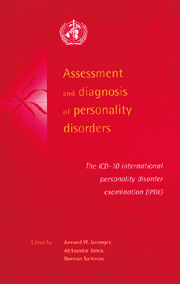 Assessment and Diagnosis of Personality Disorders
Assessment and Diagnosis of Personality Disorders Book contents
- Frontmatter
- Contents
- Contributors
- Preface
- Acknowledgements
- I Background and Field Trial
- Background
- Field Trial
- Sampling, interviewers, interview procedures
- Description of centres participating in the IPDE field trial
- Results
- Discussion and conclusions
- Appendix
- II International personality disorder examination (IPDE) ICD-10 module
- Index
Description of centres participating in the IPDE field trial
from Field Trial
Published online by Cambridge University Press: 04 August 2010
- Frontmatter
- Contents
- Contributors
- Preface
- Acknowledgements
- I Background and Field Trial
- Background
- Field Trial
- Sampling, interviewers, interview procedures
- Description of centres participating in the IPDE field trial
- Results
- Discussion and conclusions
- Appendix
- II International personality disorder examination (IPDE) ICD-10 module
- Index
Summary
Bangalore
Bangalore has been the capital of the southern Indian state of Karnataka (formerly Mysore) since 1830. The name comes from the word ‘bendakalooru,’ which means ‘village of boiled grains’ in the Kannada language. It is the fifth largest city in India, with about four million inhabitants consisting primarily of three cultural and linguistic groups: Kannada, Telugu, and Tamil. Bangalore was the headquarters of the British administration until 1881, and Britain retained its colonial and military presence there until independence in 1947. The city has an old section and several surrounding modern suburbs with many parks, wide streets, and a sprawl of military cantonments to the east. Often called the Garden City of India because of its salubrious climate, but more recently its rapid industrialization has also earned it the sobriquet, Silicon City.
The National Institute of Mental Health and Neuro Sciences (NIMHANS) is the largest mental health institution in the area and the largest postgraduate training centre in the country. It was established in 1974 as an autonomous institution, that amalgamated the Mental Hospital and the All India Institute of Mental Health. There are 24 departments grouped into three major sections: behavioural sciences, basic sciences and neurosciences. There is an 805-bed hospital with provision for 650 psychiatric and 155 neurological and neurosurgical patients. There is a multidisciplinary approach, which integrates service, training, and research in mental health and the neurosciences.
- Type
- Chapter
- Information
- Assessment and Diagnosis of Personality DisordersThe ICD-10 International Personality Disorder Examination (IPDE), pp. 61 - 69Publisher: Cambridge University PressPrint publication year: 1997


